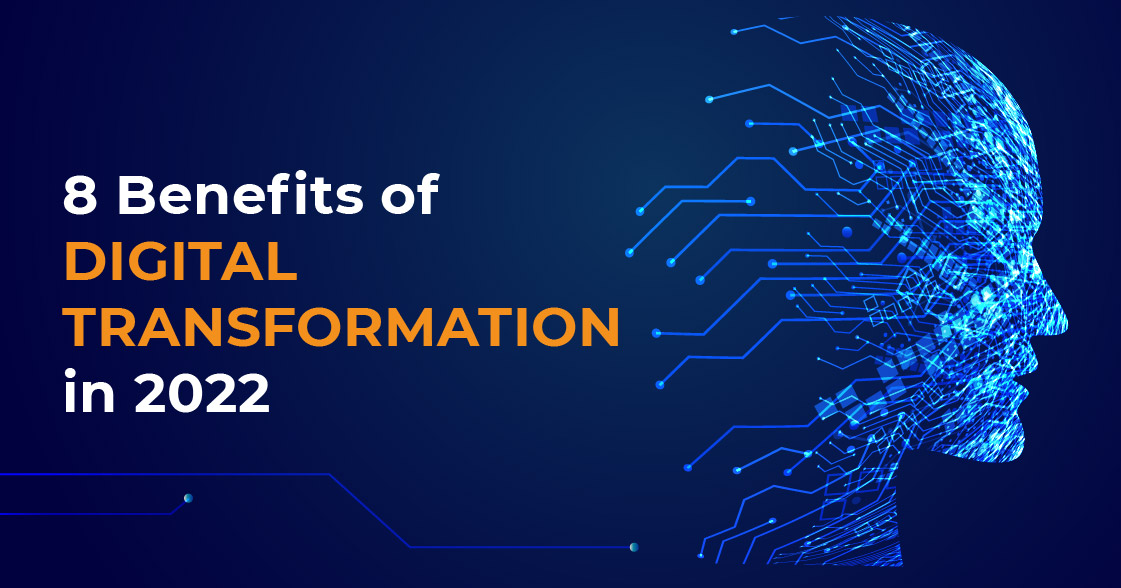The global spending on digital transformation (DX) is projected to reach 1.8 trillion U.S. dollars in 2022 as per a survey by data platform Statista published in February this year. By 2025, the digital transformation spending is forecasted to reach 2.8 trillion U.S. dollars. Digital transformation is the integration of digital technology into all aspects of a business. It has a significant impact on the way a company runs. The advantages of digital transformation can be found in a variety of industries: It enables firms to upgrade legacy processes, streamline operations, improve security, and boost profitability.
The way a company runs changes as a result of digital transformation. This process includes systems, processes, workflow, and culture. This transformation affects every level of a business and brings data from many departments together so that they may collaborate more efficiently.
Here are 8 benefits that businesses can derive from digital transformation:
Gain data driven insights:

One of the most valuable aspects of digital transformation is the capacity to manage metrics and evaluate data collected during digital marketing campaigns. Furthermore, firms can use these insights to improve their plans and processes for even greater results.
CASE STUDY:
A Fortune 500 technology business has multiple manufacturing partners, distribution networks, and clients across the globe. The company aimed to establish an analytically driven, closed-loop, and integrated demand planning method in this complicated supply chain environment. By using data driven insights and using Machine Learning ‘best fit’ algorithms, the company improved its previous forecasting method.
Improve customer engagement:


Improve customer engagement: Digital transformation enables organizations to quickly and precisely collect, store, and analyze customer data, allowing them to gain a full understanding of their customers and develop a successful strategy. Companies can utilise data analysis and Artificial Intelligence (AI) to acquire deeper insights, allowing them to develop customized products and services.
CASE STUDY:
Amazon Business is an example of ‘digital customer’ expectations making their way into the B2B world. Free two-day shipping on orders of $49 or more, exclusive price discounts, hundreds of millions of products, purchasing system integration, tax-exempt purchasing for qualified customers, shared payment methods, order approval workflows, and enhanced order reporting are few features it introduced post a digital transformation drive ( Digital Transformation solution )
Consolidate process and operation:


By moving to digital, businesses may unite not only their personnel, but also their entire infrastructure. Analytics, social networking, and even project management interfaces are examples of this. The ability to interact with and satisfy target customers is a significant benefit of digital transformation since it allows the organisation to consolidate its procedures and operations.
CASE STUDY:
Following a period of expansion (1970-1991), LEGO, the toy brand, had a continuous decline (1992-2004) and was on the verge of bankruptcy by 2004. After reaching a critical juncture, LEGO began consolidation and digital transformation efforts centred on new revenue streams such as movies, mobile games, and mobile apps. In 2014, LEGO had an EBITDA margin of 37.1 percent, up 15 percent from 2007. With a production budget of only $60 million, the first LEGO movie grossed around $468 million in 2014.
Enhance efficiency:


Since digital transformation streamlines workflows, improves information flow, and digitises company activities, it increases efficiency and productivity. It connects systems to eliminate data silos and manual processes. Furthermore, business intelligence tools such as ERP can quickly and accurately collect and analyse data. Companies can utilise such data to make better decisions sooner and more accurately than they could without advanced technology.
CASE STUDY
McDonald’s recognized a significant change in customer behaviour in 2015. McDonald’s, for example, began installing kiosks in 2015 where customers can instantly customize their hamburgers. McDonald’s used social media to give away merchandise relating to the advertisements that aired during the 2015 Superbowl football game. With digital transformation, it was able to reply to customers quickly and actively monitor social media trends in real time.
Enhances engagement:


Enhances engagement: The concept of an entire business undergoing a big digital transformation can be intimidating for personnel at all levels, from executives to entry-level workers. It is necessary to examine all procedures, strategy, the fundamental structure, and organisational culture.
Strong connections are required to maximise the chances of a successful transfer. The foundation for a smooth digital transformation is built upon digital compatibility. When all departments are connected, a strong company culture shapes, allowing a successful and confident transition.
CASE STUDY
Google encourages its employees to participate in an innovative and diverse organisational culture. This is done by streamlining and simplifying interactions between the workforce and the enterprise by leveraging technology and establishing cross-functional, enterprise-level governance.
Increase agility and innovation:


Agility in business refers to the ability to grow and improve quickly, particularly when it comes to digital processes. The digital landscape is always evolving and growing. Even the most successful businesses must be willing to adapt and innovate. New competition, tools, and trends emerge on a regular basis to offer better user experience.
CASE STUDY
Under Armour, an American sports equipment company, developed “connected fitness,” a platform for tracking, analysing, and sharing personal health data directly to customers’ phones. This platform feeds UA a stream of data that allowed them to spot fitness and health trends right away. For example, Under Armour, based in Baltimore, was able to see a walking craze that began in Australia right away. This allowed them to launch localised marketing and distribution campaigns before their competitors were aware of the situation.
Improves competitiveness:


Using digital transformation, companies can transform raw data into standardised data that produces dependable outcomes. Enterprises can optimise all critical tasks and make outstanding judgments to increase sales if they have high-quality data. Leaders can also accurately evaluate the market, spot trends, and forecast the status quo in the future. Besides, digital transformation also helps in reducing time to market.
CASE STUDY
Nespresso makes use of a modern cloud-based system with network capabilities. Its cloud solution combines an innovation platform with a full-featured sales system that can handle the whole purchasing cycle, including pricing, quotations, and orders. The digital endeavours of Nespresso have been successful, helping them stay ahead of competition. Increased penetration into new markets, increased sales and user adoption, improved sales efficiency, and enhanced visibility across the whole engagement cycle are just a few of the advantages.
Increased profit:


Digital transformation improves the efficiency and profitability of businesses. Take a look at the following findings from the SAP Center for Business Insights and Oxford Economics:
Eighty percent of businesses that have completed digital transformations have seen an increase in earnings.
According to 85 percent of respondents, their market share has increased.
On an average, leaders anticipated a 23 percent increase in revenue over their competitors.
Conclusion
Digital transformation is changing the way businesses operate. Businesses are witnessing cost savings and increasing profitability as a result of better data collection and a better customer experience. The integration of several systems into a streamlined workflow is one of the most difficult aspects of digital transformation. Despite that, digital transformation will continue to gain momentum.
Looking for expert technology consulting services? Contact us today.










